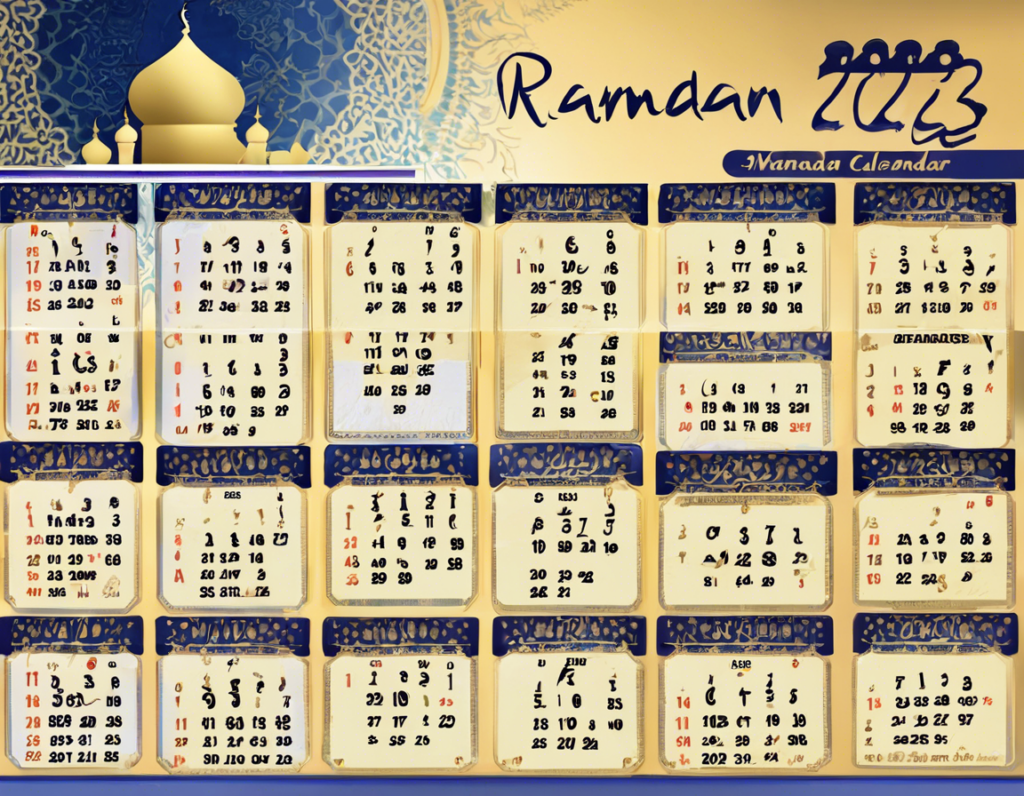Ramadan is a significant month in the Islamic calendar when Muslims around the world fast from dawn till sunset, engage in prayer, reflection, and acts of charity. Planning ahead for Ramadan 2023 can help individuals make the most of this special month, spiritually, mentally, and physically. In this comprehensive guide, we will explore ways to prepare for Ramadan, create a Ramadan calendar, and make the most of this sacred time.
Understanding Ramadan
Ramadan is the ninth month of the Islamic lunar calendar and is considered the holiest month for Muslims. Fasting during Ramadan is one of the Five Pillars of Islam and is obligatory for all adult Muslims, with certain exemptions for health reasons, travel, pregnancy, or menstruation. The fast begins at dawn with suhoor (pre-dawn meal) and ends at sunset with iftar (meal to break the fast).
Importance of Planning for Ramadan
Planning ahead for Ramadan is essential to ensure that the month is spiritually fulfilling and productive. By setting goals, organizing your time, and preparing physically and mentally, you can make the most of this blessed month. Here are some steps to help you plan for Ramadan 2023:
Setting Spiritual Goals
- Reflect on the past: Take time to reflect on your spiritual journey since the last Ramadan. Identify areas for improvement and set goals for personal growth.
- Increase worship: Plan to engage in extra acts of worship such as reading the Quran, performing additional prayers (nafl), and making dhikr (remembrance of Allah).
- Charity and community: Plan to give sadaqah (charity) and volunteer in community service activities to strengthen bonds with your community.
Creating a Ramadan Calendar
A Ramadan calendar can help you stay organized and focused during the month. Here’s how you can create a personalized Ramadan calendar:
1. Daily Schedule
- Suhoor: Wake up before dawn to have a nutritious suhoor meal.
- Fajr Prayer: Start the day with the Fajr prayer.
- Work/School: Adjust your work or school schedule to accommodate Ramadan activities.
- Dhuhr and Asr Prayers: Make time for midday and afternoon prayers.
- Reading Quran: Allocate time for reading and reflecting on the Quran.
- Iftar: Prepare for iftar and break your fast with dates and water.
- Maghrib Prayer: Pray the Maghrib prayer at sunset.
- Isha and Taraweeh: Attend the Isha and Taraweeh prayers at the mosque or at home.
- Qiyam-ul-Layl: Wake up for the night prayers and Tahajjud.
2. Weekly Goals
- Community iftars: Plan to host or attend iftar gatherings with friends and family.
- Charity events: Volunteer at local food banks or organize a charity event.
- Family time: Allocate specific days for quality time with family and loved ones.
3. Personal Reflection
- Journaling: Keep a Ramadan journal to reflect on your daily experiences and spiritual growth.
- Gratitude: Practice gratitude by listing things you are thankful for each day.
- Self-care: Schedule time for self-care activities such as exercise, meditation, or relaxation.
Tips for a Productive Ramadan
- Time management: Prioritize your time and focus on activities that will bring you closer to Allah.
- Healthy habits: Maintain a balanced diet, stay hydrated, and engage in physical activity during non-fasting hours.
- Avoid distractions: Limit screen time, social media, and unnecessary activities that detract from your spiritual goals.
Frequently Asked Questions (FAQs)
1. Is it permissible to fast during Ramadan if one is sick or traveling?
Yes, Islam provides exemptions for fasting during Ramadan for those who are sick, traveling, pregnant, breastfeeding, menstruating, or experiencing other health conditions. However, they are required to make up for the missed fast days at a later time.
2. How can one make the most of Laylat al-Qadr (Night of Decree) during Ramadan?
Laylat al-Qadr, often referred to as the Night of Decree, is considered the most virtuous night of the year. To maximize the benefits of this night, Muslims are encouraged to engage in prayer, recitation of the Quran, supplication, and seeking forgiveness.
3. What is the significance of Taraweeh prayers during Ramadan?
Taraweeh prayers are additional prayers performed after the Isha prayer during Ramadan. It is a Sunnah practice that allows Muslims to recite the Quran and seek spiritual growth during the blessed month.
4. How can one maintain focus and motivation throughout Ramadan?
To stay focused and motivated during Ramadan, it is important to set clear goals, seek support from family and community, avoid negative influences, and regularly engage in acts of worship, reflection, and self-improvement.
5. How can individuals support their Muslim friends and colleagues during Ramadan?
Supporting Muslim friends and colleagues during Ramadan can include being understanding of their fasting schedule, participating in iftar gatherings, offering assistance with work tasks, and showing empathy and respect for their religious observances.
Conclusion
Planning ahead for Ramadan 2023 can help individuals approach the month with intention, purpose, and dedication. By setting spiritual goals, creating a personalized Ramadan calendar, and following tips for a productive Ramadan, you can make the most of this sacred time. Remember to prioritize acts of worship, reflection, community engagement, and self-care to enhance your Ramadan experience and draw closer to Allah. Ramadan Mubarak!
